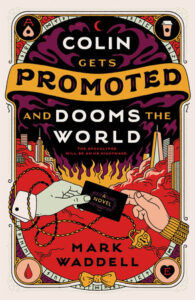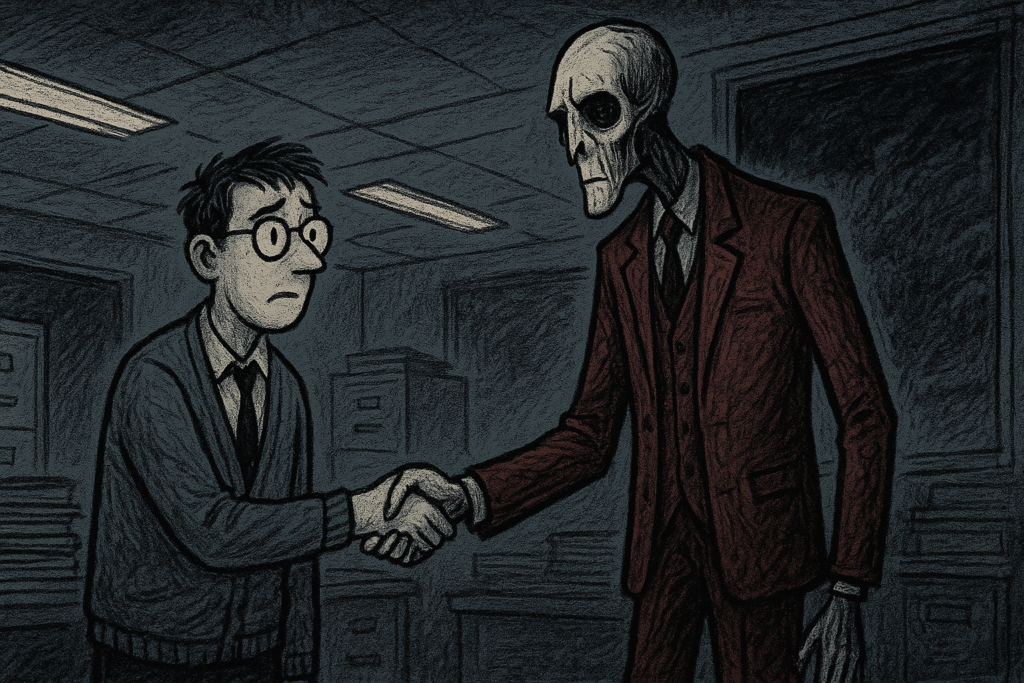A Faustian bargain
A mild-manner "nobody" strikes a deal to get a head at a company; disaster ensues.
September 25th, 2025

Mark Waddell, historian turned novelist, now based on Vancouver Island.
“One workday [Colin] meets a solitary being, ‘tall and cadaverous and dressed in a three-piece suit the colour of dried blood.’ The Thing, as Colin nicknames it, offers Colin his ‘heart’s desire’ in exchange for a ‘small, unimportant’ favour. Well aware of fairy tales that ‘involved some idiot making a deal that seems too good to be true and then regrets it later,’ Colin nevertheless takes up the Thing’s offer. Cue the ‘Dooms the World’ part of [the book’s] title.”
Review by Brett Josef Grubisic
Among his ambitious colleagues at a Human Resources department in a big corporation, mild-mannered Colin Harris is definitely a nobody. Over the years, though, he’s been listening, and if nothing else he knows” corporate speak” lingo. He is able to get a promotion.
Near the end of Colin Gets Promoted and Dooms the World (Viking $26.95), Mark Waddell’s delightfully macabre and funnily zany second novel, Colin holds his own with fearsome Ms. Crenshaw, his new boss. Taking a break from his signature cardigan, he’s wearing a suit as he defends his job at DE, a labyrinthine multinational corporation “that specializes in solving problems.”
 Lately, Colin’s star has been on the rise at DE’s Manhattan branch and he’s learned to sell his stance. The questionable action for which he might receive a reprimand was actually not bad at all, Colin claims. It “allowed Management to dynamically optimize existing inefficiencies in human capital,” he argues, using the jargon he has learned so well. Better yet, his action provided an opportunity for “Management to evolve mission-critical functionality well beyond existing projections.”
Lately, Colin’s star has been on the rise at DE’s Manhattan branch and he’s learned to sell his stance. The questionable action for which he might receive a reprimand was actually not bad at all, Colin claims. It “allowed Management to dynamically optimize existing inefficiencies in human capital,” he argues, using the jargon he has learned so well. Better yet, his action provided an opportunity for “Management to evolve mission-critical functionality well beyond existing projections.”
It’s a win-win, in other words.
For Colin, the work environment is dark and antagonistic. DE, in fact, stands for Dark Enterprises, a venerable business conglomerate that Mephistopheles might have founded if he’d been entrepreneurial and hired Edward Gorey (an artist and American writer known for his illustrated books, and illustrations for PBS’s Murder Mystery shows) as a decorator. Colin’s exacting boss, who melds the cool glamour of Miranda Priestley (the tyrannical fashion magazine editor-in-chief of the film, The Devil Wears Prada) with the malignancy of Roald Dahl’s character Grand High Witch of All the World in The Witches (George Allen & Unwin, 1983/Puffin, 2007) communes with shadowy entities, travels to other realms and casts spells. And like Ms. Priestly, Ms. Crenshaw expects her coffee exactly when she arrives at the office. For her, a minor misstep might lead to torture in a sulphurous pit. And Ms. Crenshaw is a kitten compared to DE’s otherworldly Management.
In a short time, Colin’s come a long way. In large part that’s because—of course—he’s struck a bargain, one far more consequential than Faust ever imagined.
As the novel opens, he’s miserable. At Human Resources (which extracts resources like blood, tears and screams from humans) Ms. Kettering, his former boss, belittles and threatens him. His rivalrous colleagues are worse. Colin understands that it’s only a matter of days till he’s terminated (at Dark Enterprises, that means eternal torment or an exit interview that’s fatal).
Colin is used to nightmarish situations, though. Recalling when he was twelve, far from New York City, and learning about how the “world really works,” Colin declares, “Most people call this experience middle school. For me it was hell.” And that first brush with the hierarchies of power and status taught him a lesson: “The system is designed not just to elevate the few but also to ensure that most never got close to the top.”
Instead of fighting systems of oppression, Colin fantasizes about reaching the top and raining fire on those who wronged him. With no luck whatsoever, alas. Instead, he’s lonely, wants a boyfriend, and is grateful for Amira, his roommate, to whom he fibs about work on a daily basis. The guy can’t seem to catch a break.
A lifetime of being overlooked and brushed off has him seething, and DE, supposedly “a path to genuine power,” has turned out to be more of the same.
Then one workday he meets a solitary being, “tall and cadaverous and dressed in a three-piece suit the colour of dried blood.” The Thing, as Colin nicknames it, offers Colin his “heart’s desire” in exchange for a “small, unimportant” favour. Well aware of fairy tales that “involved some idiot making a deal that seems too good to be true and then regrets it later,” Colin nevertheless takes up the Thing’s offer. Cue the “Dooms the World’” part of Waddell’s title.
Victoria resident Mark Waddell, who’s previous novel was The Body in the Back Garden (Crooked Lane, 2023) is nimble at balancing wildly disparate elements—a New York story backdrop, a meet-cute romance, a revenge fantasy, an apocalyptic narrative, a Faustian parable and workplace satire.
Waddell’s Dark Enterprises universe is a blackly comical bit and the author confidently runs with it for nearly 400 enjoyable, amusing and gruesome pages. He’s surely aware that the more-is-more story is as ridiculous as it is blood-soaked, and his buoyant, lighthearted writing, winning cast of characters (human and otherwise) and mile-a-minute plot keep the pages turning.
The novel wraps up brightly with “a lot of unoccupied real estate” in Manhattan that is “priced to sell” and Colin… well, I’m not going to reveal that. Colin does say that his story is not the kind of story where wrongs are righted. Waddell, who knows his protagonist inside and out, grants Colin a personal development that, for better or worse, is exactly right for the end of his vengeful story. 9780593818404

Illustration by Brian Nguyen
Brett Josef Grubisic writes and reviews from Salt Spring Island. He is also the fiction editor at The British Columbia Review.


Leave a Reply